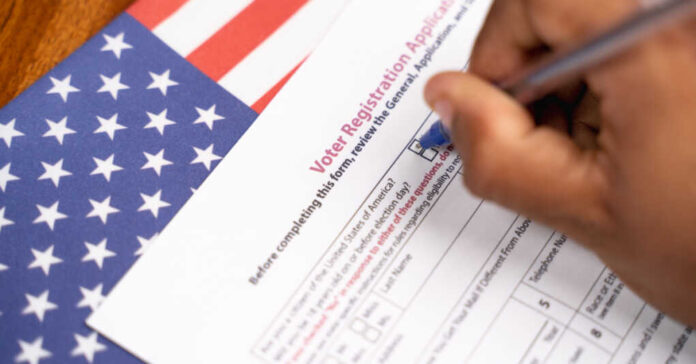
Conservatives know three things: President Joe Biden is a bumbling buffoon, the country is hardly recognizable anymore, and illegal immigrants are being imported ahead of the most significant Democratic voter fraud initiative in U.S. history.
While the first two are undeniably true, the last one requires a deeper look.
The U.S. Constitution doesn’t directly talk about whether illegal immigrants can vote in federal elections, but there are federal laws that address this. The Illegal Immigration Reform and Immigrant Responsibility Act of 1996 makes it clear that it’s against the law for noncitizens to vote in elections that choose federal officials like the President or members of Congress. People can face fines, a year in prison, or both if caught.
However, there are some exceptions. For instance, if someone’s parents were citizens, they “thought they were citizens” when they voted, or if they lived in the U.S. before they turned 16, they might not be penalized.
If an election covers issues beyond federal candidates and state or local laws allow noncitizens to vote for those specific issues, the law doesn’t apply. So far, several cities and states have allowed illegal immigrants voting power in various local elections, but they are only a negligible representation of cities across the U.S.
In Maryland, eleven municipalities grant noncitizens the right to vote in local elections on issues like mayoral races, council positions, and ballot measures. The criteria vary across towns but generally encompass legal residents aged 18 or older who have resided there for a designated period. Some municipalities even permit illegal immigrants to vote.
Two Vermont cities, Winooski and Montpelier, allow noncitizens to vote in local elections, including mayoral contests, council selections, and budget decisions. Eligibility extends to legal residents over 18 who have established residency in the city for at least 30 days.
New York City allows noncitizens to vote in local elections such as mayoral, comptroller, and council races. This policy applies to legal residents, including green card holders and individuals with work permits, who are 18 years or older and have resided in the city for a minimum of 30 days.
Surprisingly, San Francisco has been the only city in California that has allowed noncitizens to participate in voting, and only in school board elections. This policy extends to legal residents, including green card holders and individuals with work permits with children in the public school system.
Meanwhile, several states, including Alabama, Arizona, Colorado, Florida, Louisiana, North Dakota, and Ohio, have enacted laws explicitly barring noncitizens from voting in state and local elections.
The Illegal Immigration Reform and Immigrant Responsibility Act of 1996 was created because people worried about protecting the fairness and independence of the U.S. voting system and hoped to reduce the potential influence of illegal immigrants on election results. Despite these concerns, some people argue that this law isn’t necessary, effective, or fair, and there isn’t enough evidence to show that illegal immigrants are voting in large numbers across the country.
Even though illegal immigrants cannot vote in U.S. elections, they still have the potential to influence politics in several ways. The most significant impact lies in population counts. Illegal immigrants are included in the census, which helps determine the distribution of seats in the House of Representatives and the Electoral College. Consequently, states with larger undocumented populations may gain more political representation than their citizen population would warrant. This appears to be the immediate goal of unchecked illegal immigration.
As it stands, Democrats can leverage illegal immigration to their advantage. Still, there is no clear path forward for allowing noncitizens to vote without complete Democratic control of the House and Senate.
Democrats could try overturning the Illegal Immigration Reform and Immigrant Responsibility Act of 1996, but this would need approval from the House and the Senate and the president’s signature. Alternatively, they could create a new law that lets illegal immigrants vote in federal elections, which would also need approval from Congress and the president.
For now, illegal immigration remains a national security, logistical, and humanitarian crisis but not an outright Democratic strategy to pad their voter rolls. This may change if Democrats can legislate a pathway to legal citizenship for the 2 million illegals currently in the U.S., but Republicans are determined to block their efforts. This is why it’s imperative for Republicans to retain the House and regain the Senate, or conservatives will lose their voice in every future election.
For the most part, illegal immigrants are looking to stay under the radar. An unlawful vote for Biden isn’t worth the possibility of penalties such as imprisonment, hefty fines, or deportation. Biden is not worth a citizen vote, and for noncitizens, he is certainly not worth throwing away all the freebies enjoyed under his watch.







